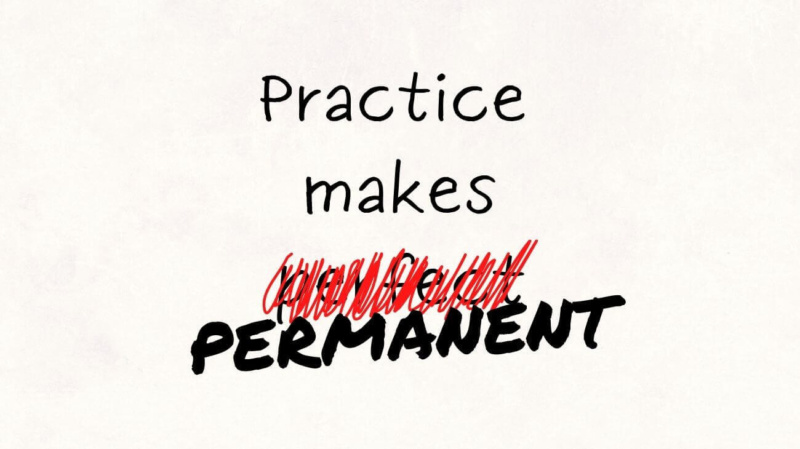Practice makes permanent. We’ve all heard the expression “Practice makes perfect.” It’s a great quote but not accurate.
Practice doesn’t make perfect but it makes us better at what we are practicing. We repeat an action over and over until it no longer requires effort or thought to do. It becomes a habit and creating good habits is one of the keys to success.
Practice Makes Competent
Performance coach, Martin Broadwell introduced the world to the 4 stages of competence. He identified four psychological states we all go through when learning new skills. These levels help us understand how practice makes permanent.
The four stages are:
- Unconscious incompetence – “I can’t and I am not aware of it”
- Conscious incompetence – “I am aware that I can’t”
- Conscious competence – “I can but it takes effort”
- Unconscious competence – “I can do it without thinking”
The first time you do something, it takes effort. In fact, you may not be able to do it at all or you do it poorly. Your brain has not yet formed the neural connections that would make the behavior doable.
So you practice. You try again and soon, the action becomes familiar.
The more you practice, the closer you get to what’s known as unconscious competence. After about 2- 3 months of deliberate practice, the action is automatic. You no longer need to think about it to do it.
It doesn’t mean you do it perfectly. But you do it automatically.
It’s like driving a car. In the beginning, you are conscious of every single action. After a while, turning on a blinker, stirring the wheel, and pushing the gas pedal become automatic.
Does it mean they’re perfect drivers? Will they ever be? I’m sure you know people who have decades of driving experience who would need a driving lesson or two.

Practice Changes Your Brain, Permanently
When you practice, the brain creates new neural connections. Its circuitry changes in response to the new behavior. The more you practice, the stronger these pathways become and the more permanent the habit becomes.
This is why few people ever forget how to ride a bike. The hours of practice they put in as children cemented the habit.
Practice makes permanent means we become what we practice. It changes who we are, what we can do, and how we see the world.
You’ll need to combine practice with continuous improvement.
5 Tips to Practice Effectively
1. Chunk down what you’re trying to learn. Every macro skill is made of smaller, micro-skills. To practice effectively, break down the skill you’re trying to learn into small chunks. Then practice them one at a time.
2. Make a “do not practice” list: Because practice makes permanent, we want to avoid learning mistakes. Unlearning mistakes is much harder to do than avoiding them in the first place. Find out what common mistakes people make when learning your new skill and add them to a “do not practice” list. Make that list prominent when you practice so you remember what they are.
3. Document your progress: Practice without improvement doesn’t get you any closer to perfection. Keeping a weekly, monthly, or quarterly journal is an effective way to know if you’re making progress. If you notice you’re stagnating, add new elements to your practice.
4. Celebrate small wins: positive reinforcement helps build confidence and keep practice consistent. Instead of beating yourself up when things don’t go as planned, try creating small rituals to celebrate your progress.
5. Finish on a high note: Ernst Hemingway used to end his writing sessions in the midst of creative flow. Sometimes mid-sentence. That way, he knew exactly where to pick up the next day and was eager to continue. Instead of ending your practice sessions when you’re tired or stuck, train yourself to finish on a high note.

